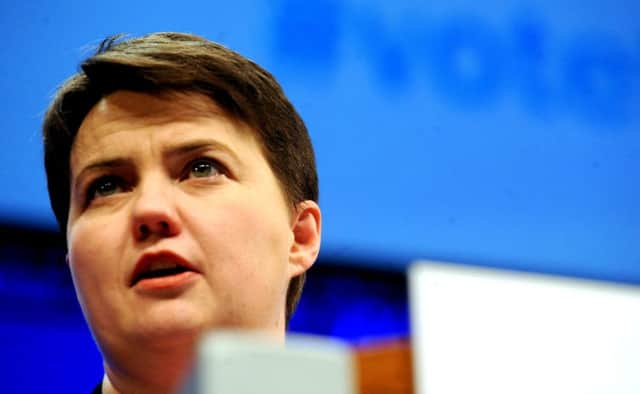Leaders: Tories’ tough task of making a difference


The week started with a party political broadcast for which Scottish leader Ruth Davidson won plaudits for a punchy message about her brand of modern Scottish Conservatism.
Ms Davidson, after a shaky start, has developed into a very effective advocate for her party – although her vigour and youth often stand in stark contrast to the party’s ageing membership roll.
Advertisement
Hide AdAdvertisement
Hide AdThe week ended with David Cameron, as Tory Prime Minister, lending his presence to a Royal Navy warship jobs’ announcement for Scottish shipyards.
This was sweet enough, but the fact that the shipyards played heavily in the referendum campaign last year – a campaign won by advocates of the Union, including the Tories – made it all the sweeter for the party faithful.
And yet the Scottish Conservative and Unionist Party still faces the same problem in Scotland it has faced for the past three decades – the problem of relevance, or rather the lack of it.
Ms Davidson has introduced a raft of imaginative policy proposals for inclusion in the party’s election manifesto, most recently this week on nursery education and freeing up schools from local authority control.
But the chances of these or any other Scottish Tory measures seeing the light of day are small, to say the least.
True, in the past the Tories have been able to get some of their policies adopted by a Holyrood government. In 2007 it was a deal between Annabel Goldie and Alex Salmond that put the SNP into power as a minority government.
This was in exchange for the Nationalists agreeing to implement Conservative policies in a number of key areas, including policing.
But that is unlikely to happen again – how could Nicola Sturgeon do a deal with the Tories at Holyrood when she has expressly ruled out doing a deal with the Tories at Westminster? Or perhaps this is to underestimate Ms Sturgeon’s flexibility on the issue of principled stands?
Advertisement
Hide AdAdvertisement
Hide AdEven if the Scottish Tories enjoy a modest recovery in May – a Labour and Lib Dem collapse could conceivably hand the party a few more Scottish seats, if its own vote holds up – they will still be a long way away from being able to implement a distinctively Conservative agenda at Holyrood.
In a new age of unlikely political alliances and the breaking down of old political patterns, it is still hard to see the Conservatives getting anywhere close to power north of the Border. In fact, the Greens probably have a better chance.
Ms Davidson is doing a good job as leader, and her forensic scrutiny of the Scottish Government in the Holyrood chamber has won her fans. But it is still difficult to answer the old question: what are the Scottish Tories for?
Fight for young hearts and minds
Teenagers have always had a thirst for excitement and danger. They have always been captivated by the romantic and idealistic.
Here in the UK this seldom leads to anything more serious than a minor brush with the law, a boyfriend/girlfriend deemed by parents as undesirable, or a flirtation with an unpleasant fad.
And yet now, here in 2015, it means some British-born Muslim girls deciding to travel on their own to a different continent to give themselves to a death cult of sadistic killers.
The case of London girls Shamima Begum, 15, Kadiza Sultana, 16, and their unnamed 15-year-old friend is not the first instance of the phenomenon now known as “jihadi brides”.
In Scotland we have already seen women travel to the Middle East to join up with the violent extremists of Islamic State, which is seeking to impose a murderous caliphate across Syria and Iraq, with more recent gains reported further west in Libya.
Advertisement
Hide AdAdvertisement
Hide AdLast night police were hopeful the girls were still in Turkey and had not yet crossed the border into Syria. But it is clear this trend is now a deeply worrying one for many parents of Muslim girls in Britain.
Yesterday Commander Richard Walton, of the Metropolitan Police, expressed his concern. “The choice of returning home from Syria is often taken away from those under the control of Islamic State,” he said.
The responsibility lies with the whole of British society to include all our citizens in a generous definition of citizenship, and reduce the chances of more young girls taking such a drastic step away from their families, from tolerance, and civilised values.
FOLLOW US
SCOTSMAN TABLET AND MOBILE APPS